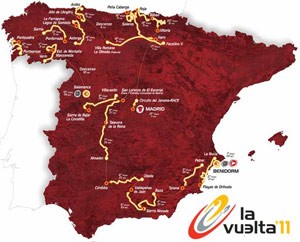Explains earlier start and why he understands the absence of Alberto Contador
 Javier Guillén is heading into his third year as the race director of the Vuelta a España, the third and final Grand Tour of the season. It starts on August 20 in Benidorm, in south eastern Spain and ends three weeks later in the country’s capital, Madrid. The riders will return to the Basque Country after a long absence and tackle the Anglirù once again. Guillén explains the modified start time and gives his thoughts on the field he has attracted.
Javier Guillén is heading into his third year as the race director of the Vuelta a España, the third and final Grand Tour of the season. It starts on August 20 in Benidorm, in south eastern Spain and ends three weeks later in the country’s capital, Madrid. The riders will return to the Basque Country after a long absence and tackle the Anglirù once again. Guillén explains the modified start time and gives his thoughts on the field he has attracted.
One of the changes compared to last year is the date that has been moved up by a week. This was done with both beginning and end in mind. “It’ll still be holiday time in Spain. Therefore, we hope to attract more people on the roadsides and in front of the TV,” Guillén says. “Schools are closed. We want to give the youth the opportunity to contribute to the success of the Vuelta.”
The earlier end date has direct consequences on the field. “I won’t deny that the Vuelta is also a preparation race for the World’s and I won’t complain about it. It’s a chance for us to have great riders participating,” the Spaniard says. “There is a period of two weeks between the end of the Vuelta and the road race of the World’s in Copenhagen, so they’d better finish in Madrid.”
Finishing the Vuelta will give riders the stamina they need for the long race in Denmark. It attracts the sprinters to the Vuelta for an ideal build-up. “I’m sure that everyone lining up in Benidorm will be highly motivated.”
There is less time between the end of the Tour de France and the beginning of the Vuelta, which makes it hard to sign the Tour riders. But Guillén says it is not a problem. “In all the teams, everything is planned early in the year. We’ve known for a long time that defending champion Vincenzo Nibali (Liquigas-Cannondale), as well as Joaquím Rodriguez (Katusha) and Igor Anton (Euskaltel) who also have had the red jersey last year, will be present again.”
Then there are the many crash victims of the Tour, who are looking for a big result still. “Bradley Wiggins, Jurgen Van den Broeck, Andreas Klöden and Janez Brajkovic are given a second chance to get a result at a Grand Tour this year.” Mixed in with the experienced ones are the youngsters, ready to get their Grand Tour experience started. “There are also the young guns Peter Sagan and Marcel Kittel. Our start list is very attractive on many aspects.”
One rider whom many Spaniards would like to see is Alberto Contador but, aside from criteriums, he has ended his season. “I didn’t understand why he didn’t come in 2009 and 2010 but this year, it’s different. He has won the Giro and he’s tired after fighting hard at the Tour de France. He also has to deal with a legal action,” says Guillén.
The race director sees a few highlights in this year’s course, beginning with the start in tourist destination Benidorm. The Vuelta has held talks with the city for three years until the start was secured. “The 16-km team time trial on August 20 from 5 to 7pm will broadcast the best images of Benidorm.”
There is of course the classic climb, but it could be outdone by a new one. “Stage 15 to the Anglirù will be the most attractive of the three weeks for the media but there will be a few surprises like the site of San Lorenzo de El Escorial on stage 8. That could become a regular venue for the Vuelta.”
After a long absence, the Vuelta goes back to the Basque Country. The constant terror attacks in the past have kept the race out of that region. “We’re delighted to go back to a region that the Vuelta hasn’t visited for 33 years. The Basque country is the hot bed of Spanish cycling, like Brittany is for French cycling.”
Guillén is quite happy that the race returns to the home of the Euskaltel-Euskadi team. “I’m proud of taking the Vuelta back to the Basque country. It’s historical.”